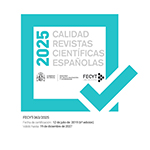Weaving Futures. Family Transnationalism in the migration from Dominican Republic and Brazil to Spain
Abstract
This article explores forms of migrant families’ reorganization within a (new) global economic crisis and the hardening of migration control in Europe; based on the cases of Dominican and Brazilian migration to Spain.
Our goal is not to characterize the wholeness of strategies from these collectives, instead visualize its heterogeneity. Displacement of Dominican and Brazilian population to Spain shares the role of women as the first link of migration chains. In both cases women are the economic support of transnational families and they lead reunification's processes. Nevertheless, differences in the time spent in the destination country, migratory status, origin (rural-urban), level of education, class and labor insertion in destination country, affect differently, the planning and start up of migration projects, the organization of care and family reunification strategies. These findings question the predominant place granted to national origin in the study of international migration.
Downloads
Article download
License
In order to support the global exchange of knowledge, the journal Investigaciones Feministas is allowing unrestricted access to its content as from its publication in this electronic edition, and as such it is an open-access journal. The originals published in this journal are the property of the Complutense University of Madrid and any reproduction thereof in full or in part must cite the source. All content is distributed under a Creative Commons Attribution 4.0 use and distribution licence (CC BY 4.0). This circumstance must be expressly stated in these terms where necessary. You can view the summary and the complete legal text of the licence.











